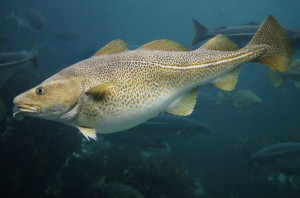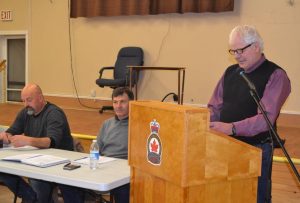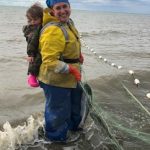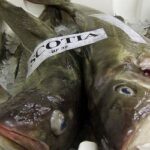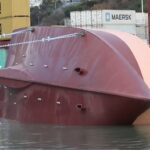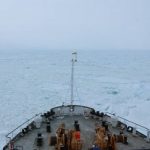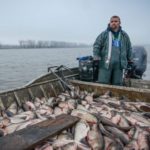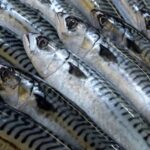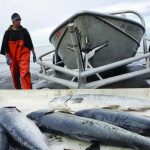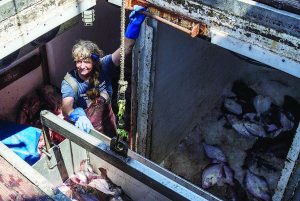Tag Archives: Sean Brillant
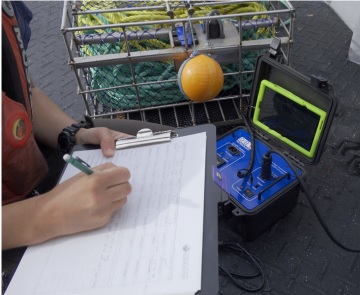
Gear-lending program has harvesters working through closures and trying ropeless fishing gear without commitment
Snow crab fishers in one area of Nova Scotia had a new visitor this season and found themselves closed out of their fishing waters. “We got a 37 percent cut in our quota and [Northern right] whales presented themselves in our zone for the first time ever so [it was] quite stressful,” said Marc Lefort, a snow crab harvester in western Cape Breton Island and a member of Area 19 Snow Crab Fishermen’s Association in Cheticamp, N.S. He’s been fishing for 19 years in the area. “It was a challenging season.” The Northern right whale is critically endangered and conservation efforts have targeted fisheries using fixed gear, or traps connected to buoys by rope. Because whales can be entangled in the fishing gear, fisheries for lobster and snow crab have been forced to think of new measures – and new fishing gear – to protect the marine mammals. >>click to read<< 12:24
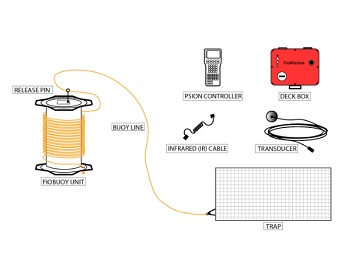
Local organization set to help fish harvesters switch to whalesafe gear
A Halifax-based organization has received $4.4 million from the Department of Fisheries and Oceans Canada (DFO) Whalesafe Gear Adoption Fund to establish a program aimed at fish harvesters transition to safer equipment. The not-for-profit Canadian Wildlife Federation (CWF) received the funding to establish the CanFish gear lending program to help recover the North Atlantic Right Whale while sustaining commercial fisheries. Among its trial gear is rope on-demand which, according to their website, can be “used to leave something on the ocean floor and retrieve it at another time without leaving a persistent line in the water column.” >click to read< 08:15
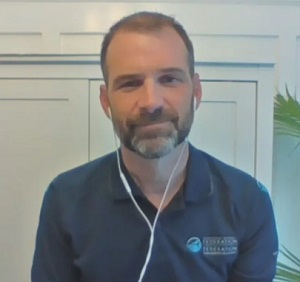
More ropeless fishing “experiments” happening on Eastern seaboard as industry leaders meet.
Sean Brillant, who works for the Canadian Wildlife Federation and is chair of the Ropeless Consortium, said they are approaching roughly 1,000 trials across the Eastern Seaboard, the bulk of which has been done in the last 12 months. “Two years ago, we were just getting laughed in our faces at the idea of doing this,” Brillant said. The methods being tested include techniques that allow a line to be stored with a trap at the ocean bottom, and then released to the surface only when a fisherman is ready to haul in their catch. The aim is to cut the risk that whales will be caught in long lengths of rope floating in the water. >click to read< 09:05

Slow response to right whale plight could have impact on Canadian fisheries
Fishermen off the U.S. east coast have confronted tight restrictions on fishing gear and vessel pace restrictions to make sure their actions don’t hurt marine mammals, together with the endangered North Atlantic proper whale. However in Canada, it was solely after proper whales started turning up lifeless in giant numbers in 2017, lots of them tangled in fishing gear and struck by vessels, that authorities introduced in emergency measures, and by then it was too late to keep away from a file variety of deaths.,,, (Sean) Brillant stated the USA legislated in 2016 >click to read< to forestall the entry into the nation of seafood that doesn’t meet strict requirements across the incidental killing of different species, together with whales. >click to read< 07:47
Temporary closure of a fishery can help whales and fishermen, biologist says
 As right whale researchers shift their focus to the Gulf of St. Lawrence, they welcome a decision by the federal government to close a snow crab fishery early after seven whales and a whale rescuer died. Sean Brillant, a senior conservation biologist with the Canadian Wildlife Federation based in Halifax, said he recently proposed a similar strategy to protect right whales that would restrict fishing during the summer in the Grand Manan Basin in the Bay of Fundy and the Roseway Basin on the Scotian Shelf. Brillant said said fishermen’s landings have reportedly declined in recent years, so the impact on them would be minimal. click here to read the story 08:13
As right whale researchers shift their focus to the Gulf of St. Lawrence, they welcome a decision by the federal government to close a snow crab fishery early after seven whales and a whale rescuer died. Sean Brillant, a senior conservation biologist with the Canadian Wildlife Federation based in Halifax, said he recently proposed a similar strategy to protect right whales that would restrict fishing during the summer in the Grand Manan Basin in the Bay of Fundy and the Roseway Basin on the Scotian Shelf. Brillant said said fishermen’s landings have reportedly declined in recent years, so the impact on them would be minimal. click here to read the story 08:13
Researchers seek fishing ground closures off N.S., N.B., to protect right whales
 Canadian researchers say they have a solution to a new U.S. government requirement that its seafood imports be caught in a way that minimizes harm to marine mammals. Sean Brillant, the report’s lead author, has recommended the summertime closure of Roseway Basin off southwestern Nova Scotia and areas around Grand Manan in the Bay of Fundy. Those are two areas where North Atlantic right whales usually congregate in summer. Closing them, the paper claims, would reduce the risk of gear entanglements by more than 30 per cent at a cost of 140 tonnes in lost seafood catches. click here to read the story 09:22
Canadian researchers say they have a solution to a new U.S. government requirement that its seafood imports be caught in a way that minimizes harm to marine mammals. Sean Brillant, the report’s lead author, has recommended the summertime closure of Roseway Basin off southwestern Nova Scotia and areas around Grand Manan in the Bay of Fundy. Those are two areas where North Atlantic right whales usually congregate in summer. Closing them, the paper claims, would reduce the risk of gear entanglements by more than 30 per cent at a cost of 140 tonnes in lost seafood catches. click here to read the story 09:22


































